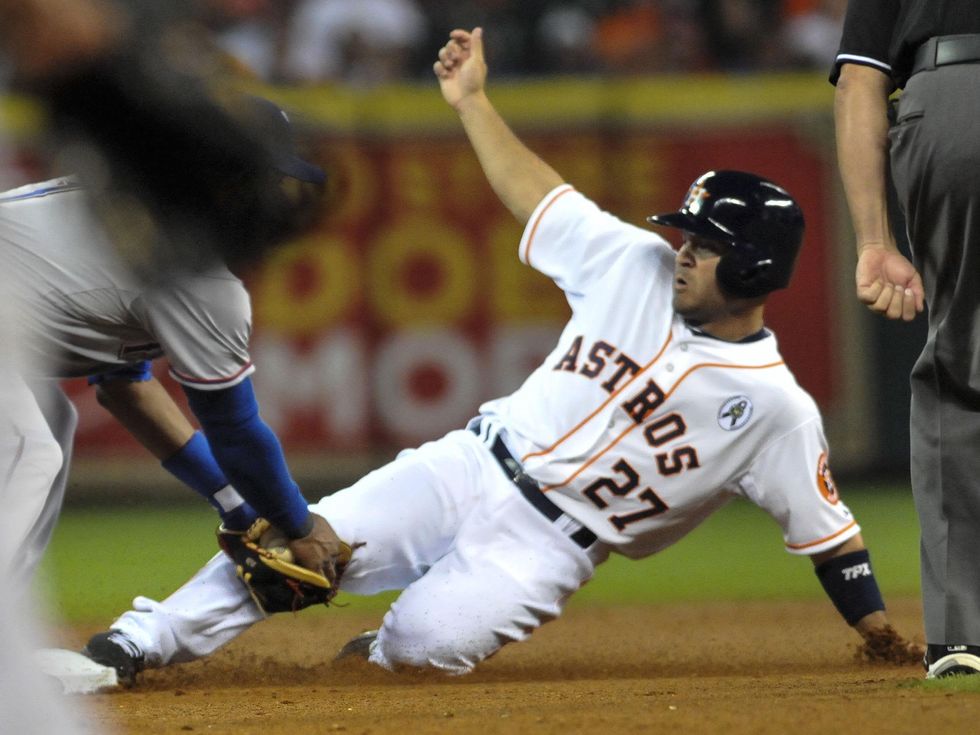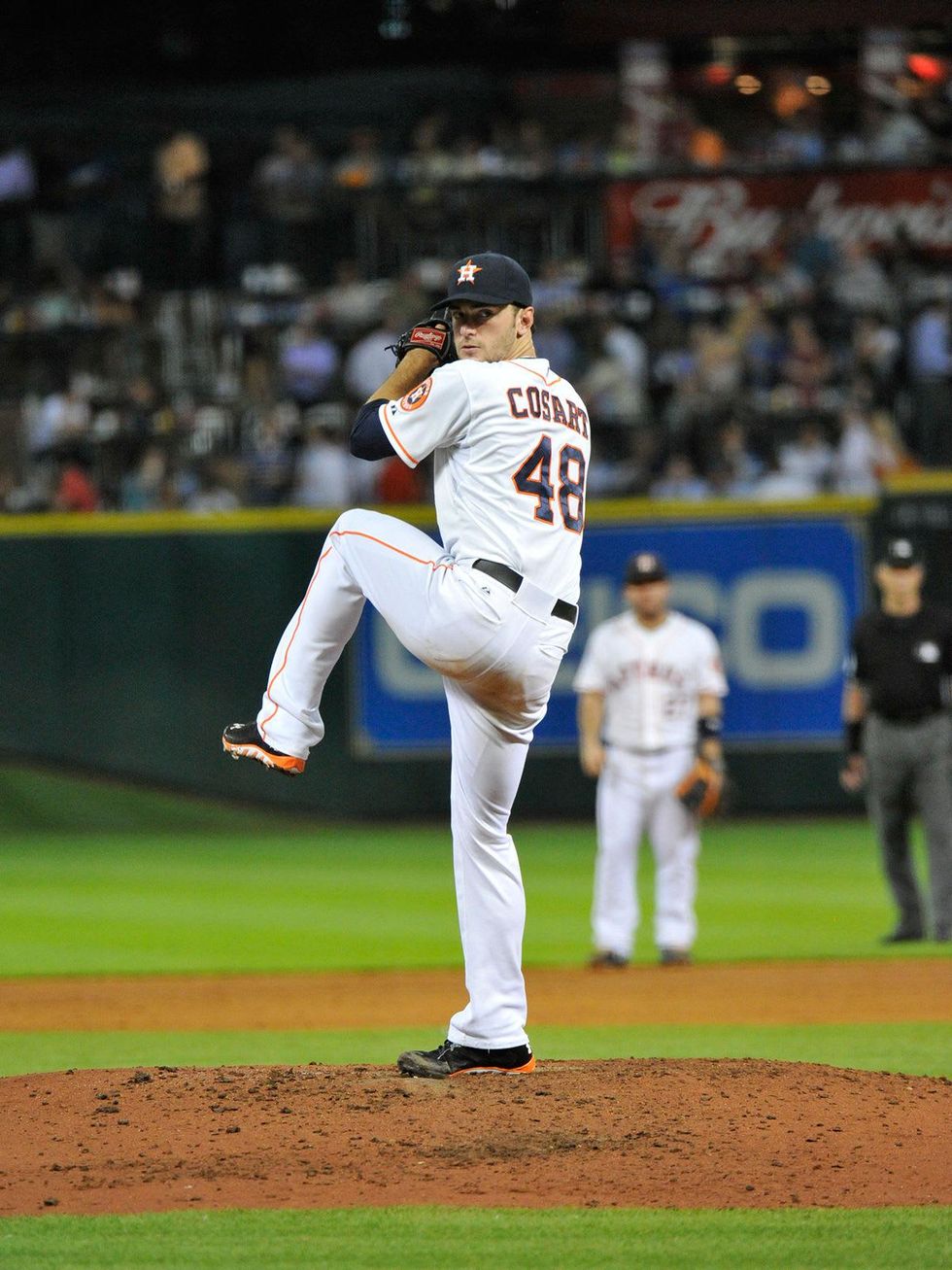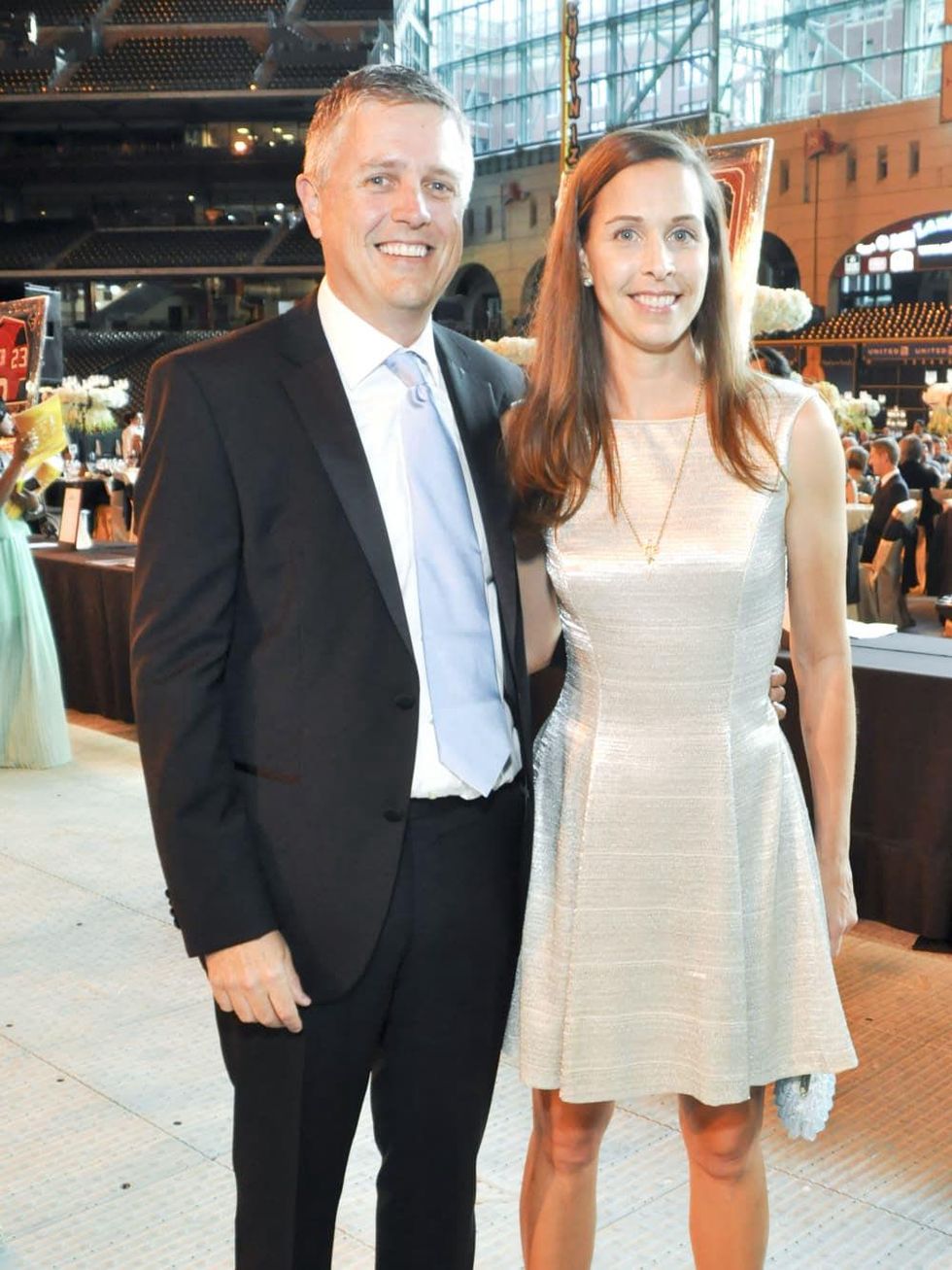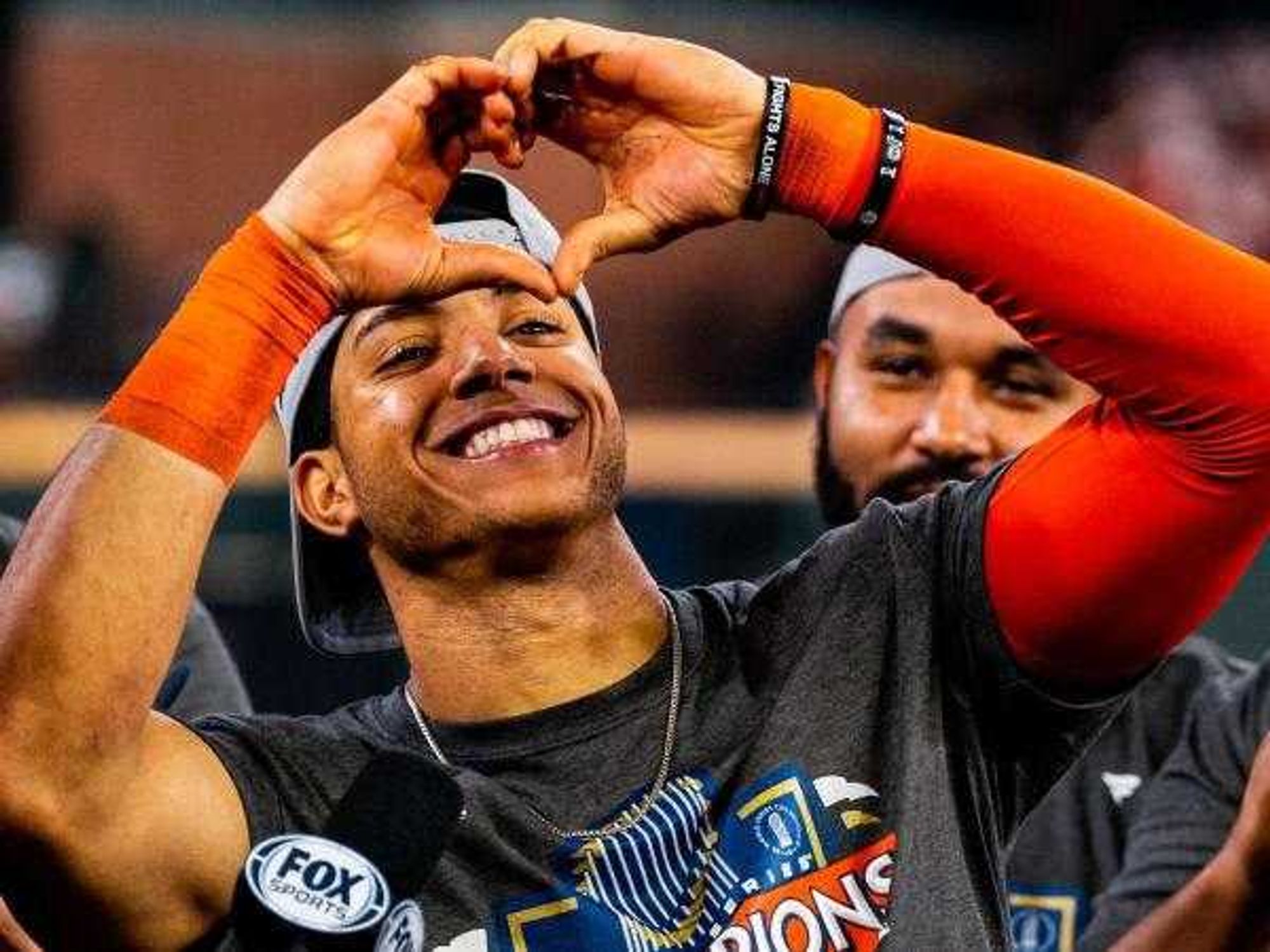Healthy Hope
Most embarrassing Major League Baseball season ever? Maybe, but it's just the start for Jeff Luhnow's Astros
There isn't any one specific moment that capably summarizes the Houston Astros' woebegone 2013 season.
Not with Astros rookie manager Bo Porter having duped veteran umpire Fieldin Culbreth and his crew into allowing an illegal pitching change against the Los Angeles Angels. Not with rookie shortstop Jonathan Villar compounding an egregious base running decision by embarrassingly sliding face-first into the rear of Cincinnati Reds second baseman Brandon Phillips. Not with Astros journeyman left-handed starter Erik Bedard tapping out of a developing (albeit highly improbable) no-hit bid citing arm fatigue. Not with Texans Rangers ace Yu Darvish fanning 52 Astros in 35 innings.
One memory can't represent so much misery.
That fact didn't prevent Astros catcher Matt Pagnozzi, purchased off the Atlanta Braves' farm on Sept. 3 as insurance for a concussed collection of backstops, from contributing to the memory vault last Saturday night when his bizarrely accidental spike of the baseball allowed the New York Yankees to score the winning run in their 2-1 victory at Minute Maid Park. Afterward, in a clubhouse subdued by the stench of a 14th consecutive defeat, Pagnozzi appeared to have an easier time explaining his outrageous gaffe than hiding his disdain over the manner in which the Astros rolled over for Yankees southpaw (and, for the umpteenth time, Houston native) Andy Pettitte, who twirled his first complete game since 2006 in the final start of his illustrious career.
Arizona held the previous single-season mark for strikeouts, and for the Astros to eclipse that standard without being hamstrung by pitchers fanning more than one third of their plate appearances is galling.
When asked to comment on the events of that evening, on Pettitte being bathed in applause immediately after humiliating the feeble Astros, Pagnozzi struggled so mightily to swallow his competitive nature that he appeared to have a mouthful of motor oil. He chose his words carefully, dutifully and reverentially, but his reconciliation was as obvious as the beard on his face.
The Astros, and their shrinking legion of loyal fans, were asked to reconcile aplenty this season. While the front office beat the drum over the success of the farm system, the big league club was left to wither on the vine, compiling a third consecutive season of 106-plus losses to join the 1962-65 expansion New York Mets on that notorious list. The Astros had never lost more than 97 games in any of their 51 years in the National League. Their 51-111 free fall in their inaugural American League campaign was the bottom floor of their protracted rebuilding project.
On the farm that rebuilding continues in earnest. The Astros' system is flush with prospects and ranks among the best in the majors in talent.
Six of eight minor league clubs qualified for the playoffs, a franchise record and the most for any organization since the 2003 Pittsburgh Pirates also had six domestic clubs qualify for the postseason. Of course, minor league victories don't guarantee success on the major league level. Between 2004 to 10, the Pirates were a combined 212 games under .500 while finishing in either fifth or sixth place in the National League Central.
But that cautionary tale doesn't diminish the progress made by the Astros' top prospects during a summer where victories, and optimal health, were abundant and celebrated with enthusiasm.
"It's been an unusual year in that typically if you have a group of 20 prospects, half of them will take a step forward, a quarter of them will flatten out and a quarter of them will take a step back," Astros general manager Jeff Luhnow says. "This was an unusually successful year for us. I give a lot of credit to our minor league managers, our coaches, our strength and conditioning, our trainers.
"If you look at the list of all the top prospects pitching-wise, not one of them ended up having a major surgery this year. That's very unusual.
"They all not only stayed healthy throughout the year, but they continued to get better and dominate their respective leagues. That was huge."
The Cardinals Model
Astros fans certainly had reason to rejoice over the emergence of right-hander Jarred Cosart, who posted a 1.95 ERA over 10 starts, as well as the second-half resurgence of left-hander Brett Oberholtzer, who led the American League with a 1.91 ERA over his final seven starts. But Luhnow took pride in the franchise keeping its top arms functional this summer, setting the stage for the continued growth and development of the pitching prospects dotting the Astros' Top 20 list, reconfigured after the draft selections of right-handers Mark Appel and Andrew Thurman.
Luhnow remains a shining beacon of hope due largely to his impeccable reputation.
Noteworthy about that list: Of the nine pitchers listed, six were either drafted or acquired via trade by Luhnow. Left-hander Josh Hader was part of the bounty gained by shipping Bud Norris to the Baltimore Orioles while right-hander Kyle Smith joined the organization when the Astros traded outfielder Justin Maxwell to the Kansas City Royals. Right-hander Asher Wojciechowski, a fixture on the 2013 Pacific Coast League leader board, was acquired during the 2012 midseason fire sale from the Toronto Blue Jays.
While Luhnow has drafted adroitly since his hiring in December of 2011, his indefatigable pursuit of prospects via trades has sparked the Astros' ascension on lists ranking farm systems. The turnaround has been rapid, but it is far from complete.
"I would not say we're oversaturated — we're at the point where we want to be," Luhnow says. "But for every player that graduates we've got to have another one ready to go. So it's still incredibly important that our scouting department, our international department and our player development department stay focused on producing at this high level on an ongoing basis, because what I want to do is when I'm the general manager of a team that's competing for the playoffs, which hopefully we'll start in the near future, I want to be able to trade pieces in our minor league system to get those last few pieces at the big league level that will help us get there and potentially win championships."
Using the major league product put on the field this season as a guide, those championship aspirations appear light years away. At the heart of an overmatched offense that ranked 27th in wRC+ (86) and 28th in wOBA (.298) was a lineup that struck out a major-league record 1,535 times. The 2010 Arizona Diamondbacks held the previous single-season mark for strikeouts, and for the Astros to eclipse that standard without being hamstrung by pitchers fanning more than one third of their plate appearances is galling.
Arizona struck out in 24.7 percent of its plate appearances three years ago. The Astros did so 25.5 percent of the time this season, setting a mark for futilely unproductive at-bats that will be nearly impossible for another American League team to surpass.
Incredibly, their pitching was worse. The Astros ranked last in FIP (4.67), WHIP (1.49) and walk rate (9.7 percent) while finishing 29th in strikeout rate (17 percent) and 28th in opponents' batting average (.268). Their bullpen was the laughingstock of the majors, finishing dead last in home runs/nine innings (1.43) and WAR (-5.4) while producing a FIP (5.04) 16.9 percent higher than the Chicago Cubs' second-worst bullpen in the league.
Following the midseason trade of closer Jose Veras to the Detroit Tigers, the Astros endured a stretch or relief performances so wretched that manager Bo Porter appeared at his wit's end on numerous occasions when the time came for him to make the call to the bullpen in order to spell a starter fatigued from another valiant display.
Interestingly, Veras was the lone veteran the Astros acquired last offseason subsequently flipped for prospects (outfielder Danry Vasquez and right-hander David Paulino). Although the Astros signed the likes of Carlos Pena, Rick Ankiel, Ronny Cedeno, Philip Humber and Bedard to provide a veteran presence in their youthful clubhouse, a secondary goal was to parlay any level of exceptionality from that quintet into additional prospects pilfered from postseason-pursuing teams at the deadline. All five under-performed with Pena, Ankiel, Cedeno and Humber designated for assignment at various points during the season (Humber cleared waivers, accepted a demotion to Triple-A Oklahoma City, and was later recalled on Aug. 13). Bedard finished 4-12.
Wading through the morass of such ineptitude left Astros fans glum and dismissive of even the most convincing arguments supporting the rebuilding plan. But even with all the losing and the multiple public relations failings, the latest being a nasty public spat between the Astros and CSN Houston, Luhnow remains a shining beacon of hope due largely to his impeccable reputation.
The St. Louis Cardinals, an organization for which Luhnow worked nine years (2003-11), clinched the National League Central title and earned home-field advantage throughout the chase for the pennant. The Cardinals are postseason participants for a seventh time in 11 years, including a third in succession, on the strength of a roster Luhnow helped build.
Four Cardinals everyday position players — first baseman Allen Craig, second baseman Matt Carpenter, center fielder Jon Jay, and shortstop Pete Kozma — were selected by St. Louis while Luhnow oversaw its draft. Infielders Daniel Descalso and Matt Adams, key cogs off the bench, were also Luhnow draftees, as were right-handed starters Lance Lynn and Shelby Miller.
Relievers Trevor Rosenthal and Seth Maness have played critical roles in the Cardinals' bullpen this season, while Joe Kelly toggled seamlessly between the rotation and the bullpen. All three were drafted by Luhnow, whose player evaluation skills set the foundation for two World Series championships (2006, 2011) and an additional National League pennant claimed in 2004.
The Astros acknowledge the mounting frustration of its fan base borne from the on-field failures and the front office missteps. But their attempts to shift attention from the present to the future is a sincere promise of hope. From George Springer to Jonathan Singleton to Delino DeShields to Carlos Correa, the Astros are cultivating the baseline talent needed to build a sustainable winner.
Luhnow has done it before and, even with an accelerated timeline brought about by three consecutive 100-loss seasons, he seems assured that sustained success is achievable in Houston.
"There are a lot of similarities in what we did in St. Louis in terms of developing players to what we're doing here in Houston," Luhnow says. "The difference is we're trying to do here in Houston in three years whereas it took eight or nine years in St. Louis to accomplish. We're picking at the top of the draft — St. Louis was picking at the bottom of the draft, so we have a little bit of an advantage. But in terms of being able to find guys like Allen Craig, Daniel Descalso, Matt Adams, Lance Lynn, all those players that are contributing members of the current Cardinal team, that's our goal.
"We hope that we've already found a bunch of those and we hope that we continue to find players like that."



